Can a Hemorrhoid Pop? Should You Pop a Hemorrhoid?

Hemorrhoids are swollen veins in your anus and lower rectum; they are often referred to as piles and may be compared to varicose veins.1 While nearly 75% of all adults may experience a hemorrhoid at some point in their lives, the signs and symptoms may depend on the type of hemorrhoid.1
Some individuals may not experience any symptoms at all, while others may notice pain, itching, and discomfort in the anal region, or bleeding during bowel movements.1 In some instances, blood may pool in a hemorrhoid that exists outside the anal cavity and may form a clot, also known as a thrombus.1 These may result in severe pain, swelling, inflammation and a hard lump that appears outside your anus.1
It may be tempting to pop a hemorrhoid in order to find some relief, but this is not a recommended practice. Unless a doctor has diagnosed your symptoms as being caused by a hemorrhoid, there’s actually no way of knowing if you have a hemorrhoid or what is contributing to the pain, swelling, and itching. There are a number of other conditions that have similar symptoms, such as an anal abscess, an anal fistula, an anal fissure, a skin tag or simply a condition known as anal itching.2 Attempting to pop a hemorrhoid—or what you think may be a hemorrhoid—can cause injury to the delicate skin around your anus. This may lead to a delay in diagnosing the cause of your symptoms while you wait for the area to heal.
Additionally, an open wound of any kind in the anal area is vulnerable to infection. It’s best to leave any sort of diagnosis and management to medical professionals to avoid unnecessary pain, potential misdiagnosis and prolonged healing.
What Happens if I’ve Popped a Hemorrhoid?
If you’ve popped a hemorrhoid, if it’s ruptured on its own, or if you’ve personally caused some sort of damage to your anal area, you should see your doctor as soon as possible. They can evaluate any damage caused, diagnose the issue and treat you accordingly.
If the popped hemorrhoid has become infected, you may notice signs like:3
- Heat or redness around the wound
- Swelling and inflammation
- Discharge like pus
- Fever
- Fatigue
- Pain when pressure is put on the area, like when you sit down
A sitz bath is a common recommendation to relieve symptoms of a hemorrhoid but can also be used to clean and soothe the site of a burst hemorrhoid.4 A sitz bath is a shallow warm water bath (just an inch or two of water) for the buttocks and hips that is meant to relieve itching and irritation.4 Take care to gently pat the area dry afterward, and do not wipe or rub the affected area with any amount of pressure.4
How Can I Find Relief for my Hemorrhoid?
Instead of trying to remove a hemorrhoid yourself, try one of these home remedies that can help you avoid flare ups and treat symptoms and hemorrhoid pain:4
- Exercise. Mild aerobic exercise like taking a walk can help with proper bowel function, which can also help you avoid getting hemorrhoids in the first place.
- Add more fiber to your diet. Fiber softens stools and makes them easier to pass, which can reduce pressure on existing hemorrhoids. Eating a high-fiber diet or adding supplements can decrease bleeding, inflammation and irritation.
- Don’t hold it in. When you feel the urge to have a bowel movement, go right away rather than holding it. Holding it in can cause a backup of stool inside you and lead to pressure and straining when you do end up going.
- Use topical products. While a simple ice pack can lend some cooling relief, others may prefer to reach for witch hazel wipes thanks to their soothing properties. If you’re feeling overwhelmed by over-the-counter options of hemorrhoid relief, look to Preparation H’s Relief Finder to locate the product that will help you treat and manage your specific symptoms.
While it may be tempting to try and deal with your hemorrhoid yourself, let a medical professional make a proper diagnosis and advise you on a course of treatment.
Source Citations:
- Hemorrhoids. Mayo Clinic. https://www.mayoclinic.org/diseases-conditions/hemorrhoids/symptoms-causes/syc-20360268. Accessed 9/21/22.
- Anal Healthcare Basics. National Library of Medicine. https://www.ncbi.nlm.nih.gov/pmc/articles/PMC5101094/. Accessed 9/21/22.
- Wound Infection. Seattle Children’s Hospital. https://www.seattlechildrens.org/conditions/a-z/wound-infection/. Accessed 9/21/22.
- Hemorrhoids and what to do about them. Harvard Health Publishing. https://www.health.harvard.edu/diseases-and-conditions/hemorrhoids_and_what_to_do_about_them. Accessed 9/21/22.



